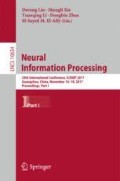Abstract
Distance metric learning plays an important role in real-world applications, such as image classification and clustering. Previous works mainly learn a distance metric through learning a Mahalanobis metric or learning a linear transformation. In this paper, we propose to learn a distance metric from a new perspective. We first randomly generate a set of base vectors and then learn a linear combination of these vectors to approximate the target metric. Compared with previous distance metric learning methods, we only need to learn the coefficients of these base vectors instead of learning the target metric or the linear transformation. Consequently, the number of variables needed to be determined is the same as the number of base vectors, which is irrelevant to the dimension of the data. Furthermore, considering the situation that labeled samples are insufficient in some cases, we extend our proposed distance metric learning method into a semi-supervised learning framework. Additionally, an optimization algorithm is proposed to accelerate training of our proposed methods. Experiments are conducted on several datasets and the results demonstrate the effectiveness of our proposed methods.
Access this chapter
Tax calculation will be finalised at checkout
Purchases are for personal use only
References
Baghshah, M.S., Shouraki, S.B.: Semi-supervised metric learning using pairwise constraints. In: Twenty-First International Joint Conference on Artificial Intelligence (2009)
Bar-Hillel, A., Hertz, T., Shental, N., Weinshall, D.: Learning a mahalanobis metric from equivalence constraints. J. Mach. Learn. Res. 6, 937–965 (2005)
Boyd, S., Parikh, N., Chu, E., Peleato, B., Eckstein, J.: Distributed optimization and statistical learning via the alternating direction method of multipliers. Found. Trends® Mach. Learn. 3(1), 1–122 (2011)
Davis, J.V., Kulis, B., Jain, P., Sra, S., Dhillon, I.S.: Information-theoretic metric learning. In: Proceedings of the 24th international conference on Machine learning, pp. 209–216. ACM (2007)
Fisher, R.: The use of multiple measures in taxonomic problems. Ann. Eugenics 7, 179–188 (1936)
Hoi, S.C., Liu, W., Chang, S.F.: Semi-supervised distance metric learning for collaborative image retrieval and clustering. ACM Trans. Multimedia Comput. Commun. Appl. (TOMM) 6(3), 18 (2010)
Hoi, S.C., Liu, W., Lyu, M.R., Ma, W.Y.: Learning distance metrics with contextual constraints for image retrieval. In: 2006 IEEE Computer Society Conference on Computer Vision and Pattern Recognition, vol. 2, pp. 2072–2078. IEEE (2006)
Jin, R., Wang, S., Zhou, Y.: Regularized distance metric learning: theory and algorithm. In: Advances in neural information processing systems, pp. 862–870 (2009)
Jolliffe, I.: Principal Component Analysis. Wiley Online Library (2002)
Li, Y., Tian, X., Tao, D.: Regularized large margin distance metric learning. In: 2016 IEEE 16th International Conference on Data Mining (ICDM), pp. 1015–1022. IEEE (2016)
Luo, Y., Liu, T., Tao, D., Xu, C.: Decomposition-based transfer distance metric learning for image classification. IEEE Trans. Image Process. 23(9), 3789–3801 (2014)
Weinberger, K.Q., Saul, L.K.: Distance metric learning for large margin nearest neighbor classification. J. Mach. Learn. Res. 10, 207–244 (2009)
Yu, J., Wang, M., Tao, D.: Semisupervised multiview distance metric learning for cartoon synthesis. IEEE Trans. Image Process. 21(11), 4636–4648 (2012)
Zhou, T., Tao, D., Wu, X.: Nesvm: a fast gradient method for support vector machines. In: IEEE 10th International Conference on Data Mining (ICDM), 2010, pp. 679–688. IEEE (2010)
Zhu, X., Goldberg, A.B.: Introduction to semi-supervised learning. Synth. Lect. Artif. Intell. Mach. Learn. 3(1), 1–130 (2009)
Acknowledgments
This work is supported by the 973 project 2015CB351803, NSFC No. 61572451 and No. 61390514, Youth Innovation Promotion Association CAS CX-2100060016, and Fok Ying Tung Education Foundation WF2100060004.
Author information
Authors and Affiliations
Corresponding author
Editor information
Editors and Affiliations
Rights and permissions
Copyright information
© 2017 Springer International Publishing AG
About this paper
Cite this paper
Wang, Z., Li, Y., Tian, X. (2017). Semi-supervised Coefficient-Based Distance Metric Learning. In: Liu, D., Xie, S., Li, Y., Zhao, D., El-Alfy, ES. (eds) Neural Information Processing. ICONIP 2017. Lecture Notes in Computer Science(), vol 10634. Springer, Cham. https://doi.org/10.1007/978-3-319-70087-8_61
Download citation
DOI: https://doi.org/10.1007/978-3-319-70087-8_61
Published:
Publisher Name: Springer, Cham
Print ISBN: 978-3-319-70086-1
Online ISBN: 978-3-319-70087-8
eBook Packages: Computer ScienceComputer Science (R0)

